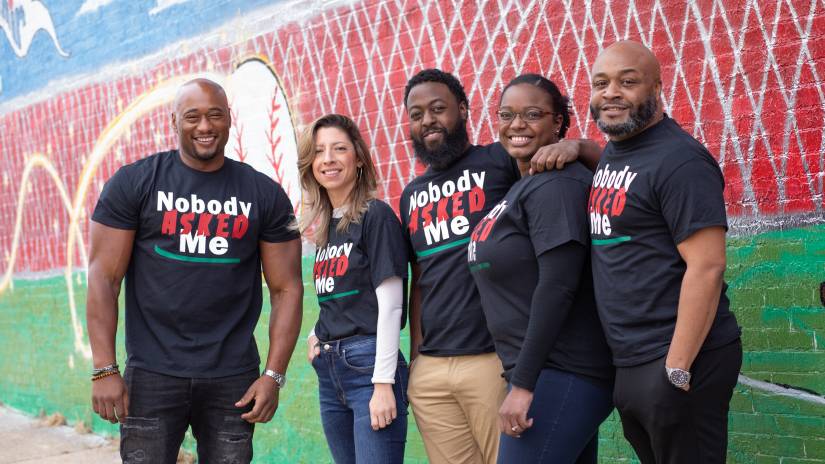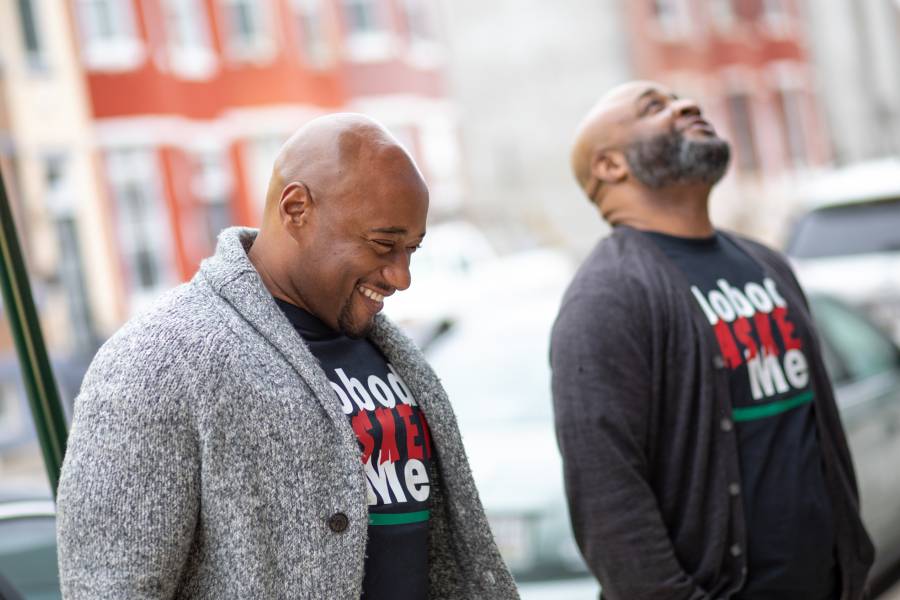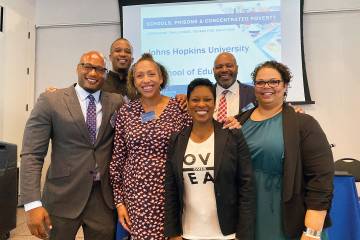When he asks young Baltimoreans about their experiences in the city, Richard Lofton inevitably hits on a theme: They feel excluded from the decisions that impact their lives most directly.
"One thing that always comes up is they say, nobody asked me about these policies, or nobody asked me about this curriculum—nobody asked my opinion," says Lofton, an assistant professor at the Johns Hopkins University School of Education.
That refrain—Nobody Asked Me—is now the name and motivation for a community research project Lofton heads that seeks to amplify the voices of families living in concentrated poverty in Baltimore. Through in-depth interviews with young people ages 14-25, along with their parents or caretakers, Lofton and his team are gathering insights they believe will be instructive for policymaking and community development.

Image caption: The Nobody Asked Me team includes (from left) Richard Lofton, Rebecca Gamez, Dantavious Hick, Zyrashae Smith, and Larry Simmons
Image credit: Chris Hartlove for Johns Hopkins University
"What does it look like for Baltimore students and their parents to have a voice at the table?" Lofton says. "Not only do we want to hear stories about their lives, but we want to center their voices with city council members and school board leaders and teachers and business leaders and state legislators."
Lofton, a faculty member of JHU's Center for Social Organization of Schools, is working alongside longtime Baltimore community organizer Larry C. Simmons, who brings with him a vast network of connections to local groups, leaders, and activists.
"I knew I could stand on my relationships and my network so we could reach Baltimore households," says Simmons, who was a Bunting Neighborhood Fellow at Johns Hopkins in 2018.
It was during that fellowship when Simmons and Lofton first struck up a friendship, which ended up becoming a productive research pairing: "the academic and the community organizer," as Simmons says. When Lofton organized a Hopkins symposium in fall 2018—"Schools, Prisons, and Concentrated Poverty"—Simmons helped recruit local panelists.
For Nobody Asked Me, the two assembled an advisory board featuring city leaders and organizers as well as Johns Hopkins public health and education experts, including Robert Balanz, director of the Everyone Graduates Center, and Joshua Sharfstein, vice dean for public health practice and community engagement at the Johns Hopkins Bloomberg School of Public Health.
Three researchers from Hopkins are helping conduct the interviews with Baltimore residents, covering topics such as community safety, mental health, education, employment, and transportation. Many interview prompts are broad and open-ended, such as, What does justice look like to you? or What does success look like to you? The goal is to provide wide perspectives and viewpoints.
"This research is actually stepping back and bringing a humanistic approach to understanding [Baltimoreans'] needs and what they want out of their lives," Lofton says.
A $75,000 Catalyst Award from Johns Hopkins gave the project a lift in 2020. They're now about a third of the way through the target 150 interviews, for which participants are compensated.
The struggles of COVID-19, of course, are bleeding into many of the conversations conducted as part of the survey. Many high-schoolers in Baltimore are helping younger siblings with virtual schooling or taking on new work to support their families, Simmons says, "so we're seeing a lot of dropouts."
The pandemic has also required interviews to take place over Zoom. "At first I was worried I wouldn't be able to connect and people wouldn't tell me their story, but I'm not getting that," Lofton says. "People have been in their homes and they've been forever reflecting on their lives and what's going on."
The end goal is to publish the findings of Nobody Asked Me, not only for academic audiences but also to share with local leaders and communities. The team is also planning a symposium in October to feature its research.
"We hope [this work] will help guide some policy decisions, and support new and equitable policies that support young people in their success and their families," Simmons says.
Posted in Voices+Opinion, Politics+Society, Community
Tagged education, center for social organization of schools, families, baltimore, youth









